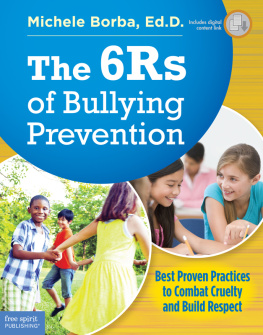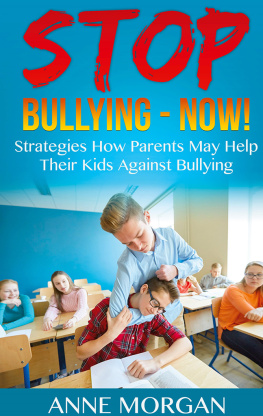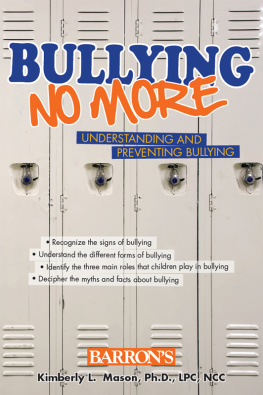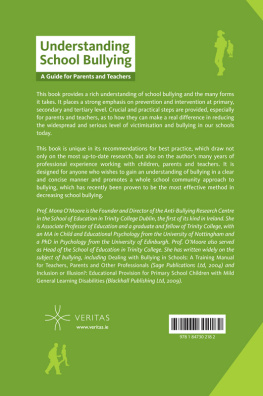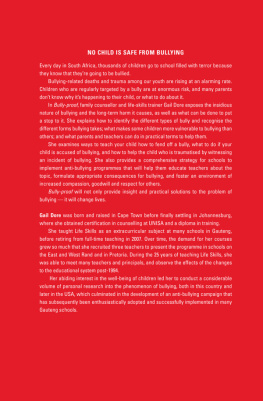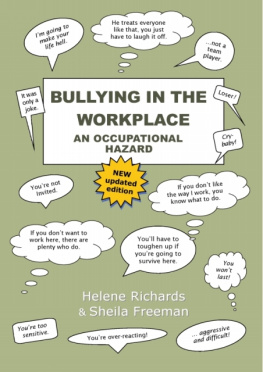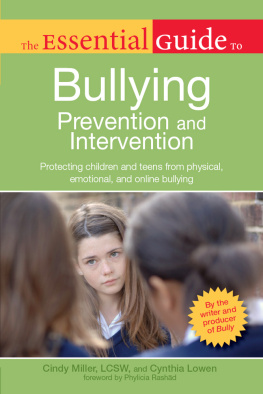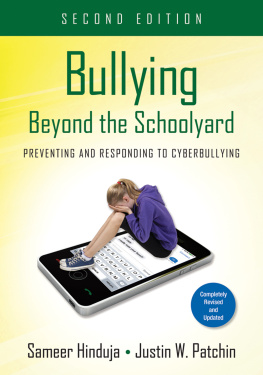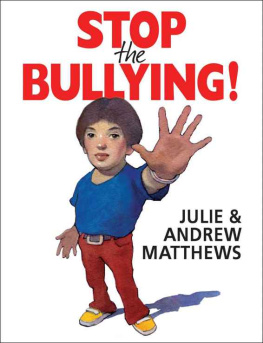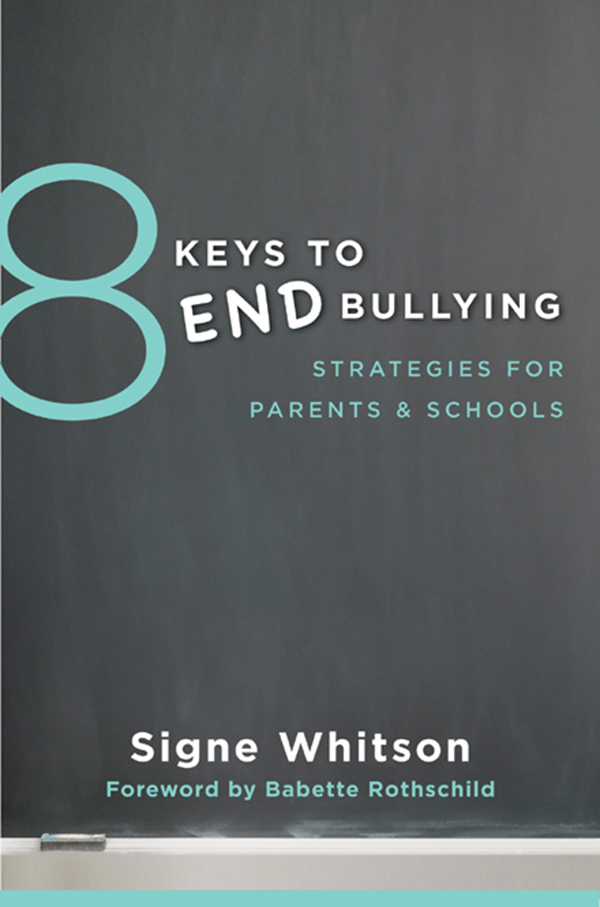
8 KEYS TO
END BULLYING
STRATEGIES FOR
PARENTS & SCHOOLS
SIGNE WHITSON
FOREWORD BY BABETTE ROTHSCHILD

W. W. Norton & Company
New York London
To Richard, Hannah, and Elise
and
to all of the awe-inspiring educators, counselors,
youth workers, and parents who know that
the little things are truly the big things
when it comes to making a difference
in the life of a child.
Babette Rothschild, Series Editor
B ullying has always been a part of group and student dynamics. It used to be that all bullying was conducted in person (and behind the back). However, the invention of the computer, email, and the advent of online social networking has brought a whole other dimension to the problem. And, of course, it is not only children who are vulnerable to bullying. Adults can also be victimized, particularly (but not only) in the workplace.
Though it has not always been recognized as a serious, societal problem, in the last few decades bullying has increasingly gained the attention of the public eye, also in the media, as more and more violence is ascribed to victims of bullying: shootings, suicides, and the like. Psychologists and other mental health professionals and researchers have also jumped into the fray; the number of studies and research on bullying are growing as well.
A volume on bullying has always been at the top of the priority list for the 8 Keys to Mental Health Series. The question was, who should write it? Through her popular website, blog, and previous publications, Signe Whitson was an obvious candidate, at the forefront of the debate. She has long worked to combat bullying as both an author and educator and she tackles the problem with immense knowledge, experience, sensitivity, wit, and plenty of heart. There can be no doubt that she is on the side of the bullied and truly wants to see an end to victimization. At the same time she is full of common sense. She recognizes that if the definition of bullying becomes too broad and watered down, attention will be thinned and it risks being misdirected. So, first and foremost, she clearly distinguishes bullying from less serious sorts of unpleasant encounters such as rudeness and simple meanness. In doing so, she highlights the serious, and sometimes tragic, consequences of bullying. And she emphasizes just how common a problem it is.
Many of us can remember one or more incidents of bullying from our childhood as victim, participant, and/or observer. I can remember several, but one stands out in particular. One day in third grade a schoolmate asked me if I was a tomboy. I liked to climb trees, run, and play sports. And Id heard that term used affectionately within my family for girls who liked such things. So I simplyand innocentlyanswered, Yes. To be honest, I also hoped it would bond us as Id seen her doing the same things and figured she was looking for a kindred spirit. However, within a day, tomboy became a swear word in the mouth of that schoolmate and anyone else she could bring on board. I was ostracized and called tomboy with derision at every opportunity.
What started as my innocent attempt at bonding turned into a nightmare for me. I dont remember how long it went ondays or weeksbut during that time tomboys werent allowed at lunch tables, group games, etc. I dont believe that everyone participated, but enough so that my school life was made very difficult. I remember crying and begging to not have to go to school. My parents, though sympathetic, had no idea how to help me. Everyone knew what bullying was back then, but it was considered just a normal part of childhood. In 1958, no one recognized how bullying could crush a childs spirit.
Finally, my parents insisted that I fight back. I didnt really know what that meant, and they didnt know how to teach me, but I nonetheless became determined not to give in to the bullies. One day at recess as we were choosing our positions for a ball game, the schoolmate challenged me, I dont want a tomboy in my field. Pulling myself together I replied, Then leave! Magically (and luckily) there was never a tomboy problem again. Of course, most bullies are not so easily deterred. I really do think I was lucky as I was on my own: no parent or teacher was there to intervene. And mine is not an example of the worst kind of bullying; I never so despaired that I considered suicide. Nonetheless, I can trace the effects of this incident into insecurities that I have had throughout my life in feeling comfortable participating in all sorts of groups.
8 Keys to End Bullying contains just what its title promises: concrete keys to identify the problem and end it. In an intimate, friendly reading style, Whitson gives specific, clear, helpful guidelines to parents, teachers and administrators, and community leaders on how to intervene in effective ways. Numerous news stories spotlight how much damage bullying can cause. Likewise, there are equally numerous inspiring examples of both small and big victories against bullying. Whitson includes examples of both. She also includes sample dialogue to follow for those who want to intervene to diffuse a difficult situation but dont know what to saysentences you can actually use to talk with your child, your student, the parent of a bully, and so forth. Each chapter ends with 10 Practical Strategies that can immediately be put into use.
Among many important points, Whitson highlights the central role of bystanders in both enabling and preventing bullying. I wish I had had the benefit of her guidance, myself, just a few years ago! I was shocked and dumbfounded to witness a respected psychiatrist bully and humiliate a workshop participant in front of the entire audience (120 or more professional therapists). You could have cut the air with a knife. I, myself, was frozen in place. Everyone else must have been as well because no one said or did anything. I am still haunted by my inability to respond, to stop the attack, or even to approach and offer support to the victim when she, some minutes later, left the room (and did not return). I still feel horrible about it. I think we were all intimidated by the arrogance and position of the speaker, and probably also afraid of professional backlash, or triggered by paralyzing memories of our own childhood victimization. Ive promised myself that Ill never let that happen again, and luckily have not had the opportunity to test it. My experience further reminds me that getting anyone, also kids, to speak out against bullying is no easy matter. Even well-informed and otherwise usually assertive adults can also find themselves unable to act. However, now, thanks to Whitsons book, I feel that I am bolstered, supported, and well supplied with plenty of ammunition should another such situation arise.
Whitsons humanity and heartfelt investment in kids comes through on every page. She gives us hope that bullying does not need to be tolerated. And that it can be better than managed, it can be stopped.
8 KEYS TO
END BULLYING
Erin had her first heartbreak at the tender age of 8. During the first week of second grade, she met a little girl named Kristy and, as so charmingly happens at that age, the two became best friends within an instant. The girls bonded over their love of a made-for-television pop group and could be spotted breaking out in spontaneous song and dance together whenever an unstructured school moment was offered. They quickly became a package deal inside and outside of the classroom, arranging lunch dates at school and playdates when school was not in session.
Next page

